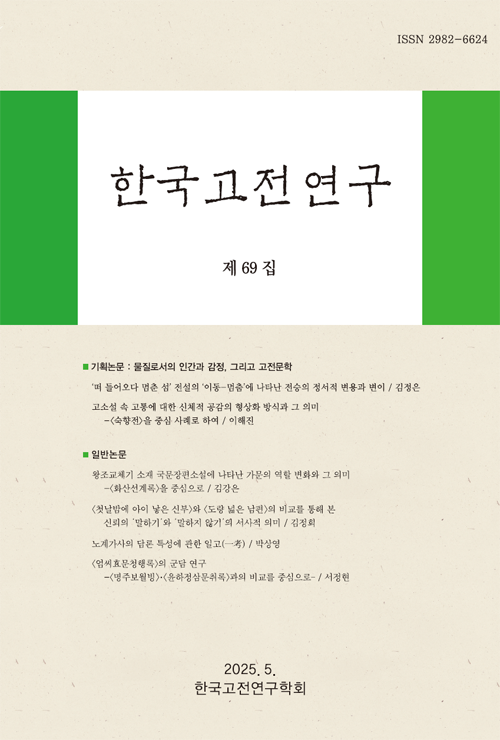- 영문명
- The Shifting Role of the Family in Korean Classical Novels Set During Dynastic Transitions : Focusing on Hwaseon Seongyerok
- 발행기관
- 한국고전연구학회
- 저자명
- 김강은(Kang-eun Kim)
- 간행물 정보
- 『한국고전연구(韓國古典硏究)』제69권, 61~96쪽, 전체 36쪽
- 주제분류
- 인문학 > 문학
- 파일형태
- 발행일자
- 2025.05.31
7,120원
구매일시로부터 72시간 이내에 다운로드 가능합니다.
이 학술논문 정보는 (주)교보문고와 각 발행기관 사이에 저작물 이용 계약이 체결된 것으로, 교보문고를 통해 제공되고 있습니다.

국문 초록
본고는 왕조교체기를 다룬 국문장편소설 <화산선계록>을 중심으로, 국가 권력을 대신하여 중심적인 역할을 수행한 가문의 서사적 기능과 그 의미에 대해 고찰하였다. 국문장편소설의 대부분이 가문의 번영과 주인공의 입신양명을 주요 서사 구조로 삼고, 국가의 위기를 일시적 배경으로만 활용해 온 것과 달리, <화산선계록>은국가의 존립이 위협받는 왕조교체기를 본격적으로 전면화하고, 새로운 왕조가 창설되는 과정에서 국가의 기능을 보완하는 가문의 역할을 구체적으로 서사화한다. 위부는 창업주 조광윤과의 밀접한 유대를 통해 왕조의 정당성을 확보하는 데 기여할뿐 아니라, 전조의 유민과 왕실 후손을 포섭하고 흩어진 공동체를 재편함으로써 사회 질서의 회복까지 도맡는다. 이러한 점에서 위부는 단순한 충신이나 협력자의 범주를 넘어, 공적 권력이 부재한 시기에 국가의 역할을 보완하는 윤리적·정치적 주체로 자리매김한다.
그러나 위부의 활약은 단지 가문의 영예에 그치지 않는다. 왕조가 안정된 이후, 위부의 행적은 돌연 역모의 가능성으로 전환되며 가문의 존립 자체를 위협하는 요소로 작용하게 된다. 왕조 성립의 실질적 주역이자 창업 공신이었던 가문이 정세의변화에 따라 곧바로 제거의 대상으로 전환될 수 있다는 사실은, 국가 권력에 대한서사의 이중적 시선을 보여준다. 이때 위부가 정치 일선에서 물러나 화산에 은거하는 결단은 단순한 퇴장이 아니라, 생존을 위한 전략적 선택으로 이해할 수 있다. 이러한 선택은 전편인 <천수석>과도 연결되는데, 이 작품에서도 위부는 왕실과의긴밀한 관계 속에서 번성하지만, 후궁의 모함으로 인해 역모로 몰리고 은거하게 된다. <화산선계록>과 <천수석> 모두에서 가문은 공적 권력과 밀착될수록 더 큰 위기에 처할 수 있으며, 국가 권력에 대한 일정한 거리를 통해 오히려 자율성과 생존을확보하려는 양상을 보인다.
이러한 서사는 단지 개별 가문의 흥망을 넘어, 국가와 가문 간의 관계를 입체적으로 사유하려는 국문장편소설의 시도로 읽을 수 있다. <화산선계록>은 국가의 공백을 메우는 가문이라는 설정을 통해 가문이 수행할 수 있는 정치적 역할을 정면에서조명하는 동시에, 국가와 가문 사이의 긴장을 형성한다. 이 과정에서 가문은 살아남기 위해 끊임없이 판단하고 스스로 결단을 내려야 하는 주체로 형상화된다. 특히19세기 국문장편소설에서 가문의 위기와 회복이 반복적으로 서사화되는 점을 감안할 때, <화산선계록>은 그 시대 독자들이 인식한 국가와 가문의 권력 관계를 섬세하게 반영한 작품이라 할 수 있다. 요컨대 <화산선계록>은 단순한 가문의 영달을다룬 작품이 아니라, 국문장편소설이 공적 권력과의 관계 속에서 가문이라는 단위를어떻게 성찰하고 재구성할 수 있는지를 탐색한 의미 있는 서사적 실험이라 할 수있을 것이다.
영문 초록
This study examines the narrative function and significance of the family that assumes a central role in place of state authority in the Korean classical novel Hwaseon Seongyerok, set during a dynastic transition. While most Korean long novels focus on the prosperity of noble families and the personal success of protagonists, using national crises merely as a background device, Hwaseon Seongyerok uniquely foregrounds the dynastic change as a major narrative axis and depicts in detail the process by which a single family substitutes for the functions of a failing state. The Wi family not only contributes to the legitimacy of the new dynasty through its close relationship with the founder Jo Gwang-yun, but also integrates displaced royal descendants and refugees, reconstituting fragmented communities and restoring social order. In this respect, the Wi family functions not merely as a loyal subject or collaborator, but emerges as an ethical and political agent that temporarily replaces the state during its absence.
However, the family’s active intervention is not simply a source of honor. Once the new dynasty stabilizes, the very acts that supported its founding are reinterpreted as signs of treason, placing the Wi family’s survival in jeopardy. That a founding family and key contributor to dynastic legitimacy can so swiftly become a target for political elimination reveals the ambivalence embedded in the narrative toward state power. The protagonist Wi Hyeon’s decision to retreat from politics and return to seclusion in Mount Hwasan is thus not a mere withdrawal, but a strategic act of preservation. This motif echoes the earlier narrative of Cheonsuseok, the preceding work, where the Wi family, despite its proximity to the throne, is similarly exiled after falling victim to palace intrigue. Both novels suggest that intimate involvement with public power carries inherent risk and that maintaining a measured distance from the state may be the only viable path to survival.
Such narratives signal an attempt by Korean long novels to critically reimagine the relationship between state and family. Hwaseon Seongyerok explores the political potential of the family as a substitute for the state while at the same time rendering the tensions and vulnerabilities that arise from such substitution. In doing so, the family is portrayed as a self-governing and adaptive entity that must continually assess its position and make decisions for its own preservation. Given the prevalence of narratives involving the decline and recovery of noble families in 19th-century Korean fiction, Hwaseon Seongyerok reflects a historical consciousness in which public authority is no longer seen as an unquestionably reliable force. Ultimately, this novel is not merely a story of familial glory, but a meaningful narrative experiment that probes how the institution of the family is redefined and restructured within the volatile dynamics of state power.
목차
1. 들어가며
2. 왕조교체기 서사 속 가문의 역할
3. 가문의 역할 변화와 소설사적 의미
4. 나오며
키워드
해당간행물 수록 논문
- 한국고전연구(韓國古典硏究) 제69권 목차
- 왕조교체기 소재 국문장편소설에 나타난 가문의 역할 변화와 그 의미 - <화산선계록>을 중심으로
- 노계가사의 담론 특성에 관한 일고(一考)
- <엄씨효문청행록>의 군담 연구 - <명주보월빙>·<윤하정삼문취록>과의 비교를 중심으로
- ‘떠 들어오다 멈춘 섬’ 전설의 ‘이동-멈춤’에 나타난 전승의 정서적 변용과 변이
- <첫날밤에 아이 낳은 신부>와 <도량 넓은 남편>의 비교를 통해 본 신뢰의 ‘말하기’와 ‘말하지 않기’의 서사적 의미
- 고소설 속 고통에 대한 신체적 공감의 형상화 방식과 그 의미 - <숙향전>을 중심 사례로 하여
참고문헌
교보eBook 첫 방문을 환영 합니다!

신규가입 혜택 지급이 완료 되었습니다.
바로 사용 가능한 교보e캐시 1,000원 (유효기간 7일)
지금 바로 교보eBook의 다양한 콘텐츠를 이용해 보세요!



